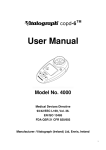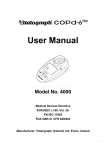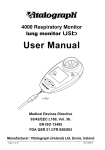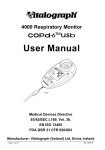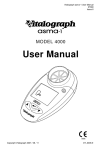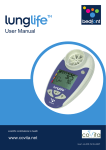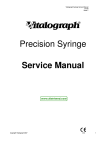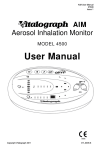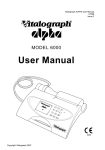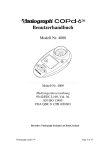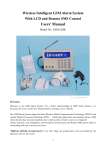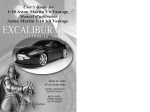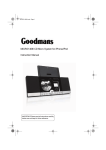Download User Manual
Transcript
Vitalograph asma-1 TM User Manual Model No. 4000 Medical Devices Directive 93/42/EEC L169, Vol. 36. EN ISO 13485 FDA QSR 21 CFR 820/803 Manufacturer: Vitalograph (Ireland) Ltd, Ennis, Ireland 1 Table Of Contents Warnings and Advisory Notices ................................................................................................... 3 Main Components of the Vitalograph asma-1TM........................................................................... 4 What Is The Vitalograph asma-1TM Used For?............................................................................. 4 What Is The Vitalograph asma-1TM Used For?............................................................................. 5 The Asthma Sufferer .................................................................................................................... 5 How To Use The Vitalograph asma-1TM ....................................................................................... 6 Setting Personal Best (Reference) Values ............................................................................... 6 Setting Management Zones ..................................................................................................... 6 Performing The Test................................................................................................................. 7 Reviewing Previous Results .....................................................................................................8 Deleting All Results History ...................................................................................................... 8 Care and Cleaning Of The Vitalograph asma-1TM In Home Use .................................................. 9 Cleaning and Disinfecting the Vitalograph asma-1TM In Clinic Use .......................................... 9 Table of Materials Used & Cleaning/Disinfection Methods ..................................................... 10 Consumables, Accessories and Spare Parts ............................................................................. 11 Explanation of Symbols.............................................................................................................. 11 Technical Specifications............................................................................................................. 12 Warranty .................................................................................................................................... 12 Appendices ................................................................................................................................ 13 Quick Start Guide ................................................................................................................... 13 Regulatory Notices for the Vitalograph asma-1TM................................................................... 14 CE Notice............................................................................................................................ 14 FDA Notice ......................................................................................................................... 14 Declaration of Conformity ................................................................................................... 16 Copyright Vitalograph 2007 Print Ref. No. 07380 2 Current Edition (Issue 2) Warnings and Advisory Notices Note: Please read all the information in this manual before using the Vitalograph copd-6. A full set of instructions, including cleaning instructions, is available at www.vitalograph.co.uk. • This Vitalograph device is intended to measure lung function for use in clinic with disposable mouthpieces or filters or for patient use at home under medical supervision. • Take care not to block the mouthpiece with the tongue or teeth. A ‘spitting’ action or coughing will give false readings. • If used at home symptoms must take precedence over device measurements*. • If the device is used for longer than its specified life, the accuracy of the device may deteriorate. • Before use, ensure that the batteries do not exceed their shelf life, as indicated on the batteries. • Store in a clean dry place. * If you suspect that a defect has occurred you should check the Vitalograph copd-6 for operation and accuracy. 3 Main Components of the Vitalograph asma-1TM A Flowhead B On / off button C Display D User buttons A B C D 4 What Is The Vitalograph asma-1TM Used For? The Vitalograph asma-1 is a medical device intended to give objective measures of lung function for help in managing asthma. The device measures airflow out of the lungs when blown into as hard and fast as possible. The Vitalograph asma-1 can reveal narrowing of the airways well in advance of an asthma attack being felt by the asthmatic. Used mainly by persons with moderate to severe and persistent asthma, the Vitalograph asma-1 can help determine: • when to seek emergency medical care. • the effectiveness of a person’s asthma management and treatment plan. • when to stop or add medication, as directed by the physician. • what triggers the asthma attack (such as exercise-induced asthma). With asthma, sometimes the sufferer may feel their breathing is fine, but when the sufferer measures it with the Vitalograph asma-1, lung function may be decreased. The Vitalograph asma-1 can help the sufferer determine airway changes and better manage the asthma. The primary healthcare professional needs to educate the sufferer in Self-Management of asthma. This will start upon diagnosis and continue with all members of the healthcare team. The Action Plan should be tailored to individual needs, but will include: basic facts about asthma; roles of medication; skills required for devices and medication, environmental control measures; when and how to take rescue actions. The Asthma Sufferer Most people with asthma need to monitor their asthma at least twice a day and to have a plan of action to keep it under control. Although how the sufferer feels and what the sufferer can do is important, PEF or FEV1 scores may accurately show how the breathing is changing. Modern asthma medicines aim to give the sufferer the best possible score, keeping the sufferer in the green zone. It is also important to aim for stable PEF/FEV1, i.e. little difference between morning and evening scores and from day to day. Many people over the ages of five will benefit from monitoring their asthma with the Vitalograph asma-1, indicating when and how much to use their reliever medication. It will also help the doctor because scores make it easier to see how well the asthma is controlled and when treatment needs changing. Only the doctor can determine the best Action Plan for the sufferer. This is likely to be preceded by an initial assessment followed by a diagnostic phase. The Vitalograph asma-1 records many test sessions for subsequent review by the healthcare professional. The Action Plan is then assessed against the scores over several days. The treatment and/or Action Plan may be changed following the diagnostic phase. This procedure may be repeated until the optimum Action Plan is proven. The ‘Personal Best’ is the best PEF or FEV1 value that the sufferer can achieve - this is the ‘100%’ or ‘reference’ value. Population normative standards are not clinically useful in ongoing serial monitoring of the asthma. 5 How To Use The Vitalograph asma-1TM Setting Personal Best (Reference) Values Personal Best (reference) values can be set for peak flow (PEF) and/or forced expiratory volume after 1 second (FEV1). To set the Personal Best (reference) PEF, follow these steps: 1. Turn the device on, D. ), press the B and C buttons together for 3 seconds. 2. When the device is ready for a test ( 3. The reference PEF value can now be set. This is done by pressing the B button and releasing when the value is reached. Press the C to roll back. The values will increase/decrease in values of 10. If the button is kept depressed, the values will scroll faster. 4. Press E to keep this reference PEF value. Press E again to exit, or to set the Best Test (reference) FEV1: 1. The reference FEV1 value is set by pressing the B button and releasing when the value is reached. Press the C to roll back. The values will increase/decrease in values of 0.10. If the button is kept depressed, the values will scroll faster. 2. Press ENTER E to keep this reference FEV1 value. The device will return to the test screen. Note: to de-activate zones, set both the PEF and FEV1 reference values to 000/0.00. Setting Management Zones The Vitalograph asma-1 can be set for use with 3 or 4 zone management plans. The zone percentages are factory set to 2 boundaries, 80% & 50%, i.e. 3 Zones (80-100%, 50-80%, 050%). For 4 zones the middle boundary is set last. The colour systems for each zone type are as follows; Top boundary Green Green Top boundary Yellow Yellow Middle boundary Orange Bottom boundary Bottom boundary Red Red 3 Zone 4 Zone To set the boundary percentage values for 3 zones, follow these steps; 1. Turn the device on, D. 2. When the device is ready for a test ( approximately 3 seconds. ), press and hold the E and B buttons for 3. The top (Green/Yellow) boundary can now be set. This is done by pressing the B or C button and releasing when the value is reached. The values will increase/decrease in values of 1%. If the button is kept depressed, the values will scroll faster. 6 4. Press E to set the top (Green/Yellow) boundary value. 5. The bottom (Yellow/Red) boundary can now be set. This is done by pressing the B or C button and releasing when the value is reached. The values will increase/decrease in values of 1%. If the button is kept depressed, the values will scroll faster. 6. Press E to set the bottom (Yellow/Red) boundary value. 7. Only 2 boundaries are required for the 3 zone system, so the next value should be selected as 0% (default). Press E. The device will return to the test screen. To set the boundary percentage values for 4 zones, follow these steps; 1. First, set the top and bottom boundaries – see above procedure (steps 1 - 6). 2. The middle (Yellow/Orange) boundary can now be set. This is done by pressing the B button and releasing when the middle boundary value is reached. The values will increase/decrease in values of 1% after an initial jump to the lower boundary value. If the button is kept depressed, the values will scroll faster. This boundary value can not be set at a value that is greater than the top boundary value or less than the bottom boundary value. 3. Press E to set the middle (Yellow/Orange) boundary value. The device will return to the test screen. Performing The Test 1. Sit down when blowing into the device (unless the physician advises otherwise). 2. Turn the device on, D, with the mouthpiece inserted (use a disposable SafeTway mouthpiece in clinic). 3. When the device is ready for a test ( ), holding the head high, breathe in as deeply as possible, hold the Vitalograph asma-1 ready in front of the mouth. 4. Holding the breath, place the mouthpiece into the mouth, biting the mouthpiece lightly, and with the lips firmly sealed around it. 5. Blow out as HARD and as FAST as possible for a second or more. Be careful not to block the mouthpiece with the tongue or teeth. A ‘spitting’ action will give false readings. 6. The PEF result for this blow will be displayed, followed by the FEV1 result after approximately 3 seconds and an arrow will indicate which colour management zone this relates to, if the Personal Best has been set. 7. With the blow icon showing, blow again ( ). Usually 3 blows are required. 8. To view the best test in the session (best PEF and best FEV1), press the E button. This is the value that is recorded for the session in the device history. ! Note: if an exclamation mark appears, this means it was not a good quality blow and the subject should blow again. If the subject experiences dizziness or fatigue during the test session, wait until this passes before blowing again or terminate the session. For a good test, the time to peak flow must be 120ms or less, and no cough in the 1st second. 7 Reviewing Previous Results The Vitalograph asma-1 can store up to 600 test sessions. In order to view previously performed test sessions, follow these steps; 1. Turn the device on, D. 2. When the device is ready for a test ( ), press the E button for approximately 3 seconds. 3. The most recent test session will now be displayed. The best PEF result will be displayed for approximately 3 seconds, followed by the best FEV1 result. The session number ‘1’ is also displayed – this is the latest session. 4. Earlier test sessions can also be viewed. Pressing the B button will show ‘2’, the previous test, and so on. 5. Press E. The device will return to the test screen. Deleting All Results History Caution: Once the history has been deleted it cannot be recovered. To delete the history entirely, i.e. all previously stored session results, follow these steps: 1. Turn the device on, D. 2. When the device is ready for a test ( approximately 10 seconds. ), press and hold the E and C buttons for 3. A long beep will indicate success and the device will return to the test screen. 8 Care and Cleaning Of The Vitalograph asma-1TM In Home Use The Vitalograph asma-1 should continue to give reliable measurements for up to three years in home use. Then replace it with a new device. The device should be kept clean and dust free. If the asthmatic suspects that the device is damaged or measuring incorrectly they should take it to their doctor who will be able to check its operation and accuracy. The mouthpiece is the only part of the device which needs to be routinely cleaned in home use. The outer surfaces should be thoroughly cleaned every week, more often if necessary. We recommend the use of an ordinary, paying special attention to the mouthpiece area. Cleaning and Disinfecting the Vitalograph asma-1TM In Clinic Use A new mouthpiece (either SafeTway or BVF) should be used for each subject. A delay of at least 5 minutes should be allowed between subjects to allow settling of previously aerosolized particles in the measuring device. It is recommended that the device be regularly cleaned according to the guidelines of the user’s facility. The disinfection materials and procedures applied in the users’ facility may be more appropriate than the methods outlined below. In the event of visible contamination of the flowhead element, it should be cleaned or disinfected as described in the accompanying table. The device should be replaced in the event of damage, or if visibly contaminated. The frequency of cleaning and disinfecting is dependent on the facility’s risk assessment, usage, and test environment, but it should be at least monthly or every 100 subjects (300 blows). It is recommended that the device be replaced annually or test and calibration serviced at least annually. There is no planned preventive maintenance for this medical device. 9 Table of Materials Used & Cleaning/Disinfection Methods This listing of materials used is given to provide clinical users with information to allow the assessment of other cleaning and disinfecting procedures available in the facility on this device. Part Material Cleaning Recommendation Disinfection Recommendation Plastic Mouthpiece ABS Wash in warm soapy water. Rinse in clean water Cold liquid, e.g. Effervescent Chlorine solution Body PC / ABS Wipe with a damp cloth Alcohol wipe Wipe with a damp cloth Alcohol wipe Wipe with a damp cloth Alcohol wipe Dispose – single use Dispose – single use Fascia Buttons SafeTway mouthpiece or BVF Polycarbonate Synthetic Rubber Cardboard / ABS (IPA 70-90%) (IPA 70-90%) (IPA 70-90%) All external parts of the Vitalograph asma-1 require cleaning, i.e. the removal of visible particulate contamination. Do not attempt to insert any object or to clean the rotor or stator in the measuring system. This device is not designated as a ‘sterile’ device. Wiping with a 70% Isopropyl Alcohol impregnated cloth provides a suitable form of cleaning and low-level disinfection for the case exterior. Repeat this at least weekly to prevent a build-up of grime from normal handling and use. Always follow the safety guidelines given by the manufacturer of cleaning and disinfectant chemicals or equipment. 10 Consumables, Accessories and Spare Parts Cat. No Description 40161 Plastic Mouthpiece for asma-1 (Pack of 12) 20303 Disposable Noseclips (200) 20242 SafeTway® disposable mouthpieces (200) 20980 Mini SafeTway® mouthpieces (50) 28350 BVF® Bacterial/Viral Filters (50) Explanation of Symbols Device symbols; k Type BF equipment j Class II The device must be taken to separate collection at the product end-of-life. Do not dispose of these products as unsorted municipal waste. h Attention (reference relevant section in manual) User Interface Symbols; Memory Symbol Battery status: Full Battery status: Half Battery status: Empty (flashing) Blow Now Symbol ! Bad Test Symbol (Cough or tPEF>120ms) 11 Technical Specifications Material: PC/ABS Accuracy: Better than ± 3% (FEV1), ± 5% (PEF) Flow Impedance: Better than 0.15kPa/L/s at 14L/s Measurement Range: PEF: 0 – 840 L/min BTPS FEV1: 0 – 9.99 L BTPS Performance And Safety Standards: EN ISO 23747:2007 Electromagnetic emissions: CISPR 11 Group 1 (battery operated) Electromagnetic immunity: IEC 61000-4-2, IEC 61000-4-3 (battery operated) Sensor Stator/rotor Power Supply 2 x AAA batteries Operating Temperature 17 – 37°C Auto power down time Set to 2 minutes as standard Warranty Your Vitalograph asma-1 is guaranteed for one year*. Replace if it is faulty, otherwise replace the unit every three years. * Excepting accidental / transit damage or inappropriate use of the device. Vitalograph Ltd. Maids Moreton Buckingham MK18 1SW England Tel: +44 (0) 1280 827110 Fax: +44 (0) 1280 823302 Email: [email protected] www.vitalograph.co.uk Vitalograph Inc. 13310 West 99th Street Lenexa Kansas 66215 USA Tel.: (913) 888 4221 Fax: (913) 888 4259 Email: [email protected] www.vitalograph.com Vitalograph GmbH. Jacobsenweg 12 22525 Hamburg Germany Tel: (040) 547391-0 Fax: (040) 547391-40 Email: [email protected] www.vitalograph.de Vitalograph (Ireland) Ltd. Gort Road Business Park Ennis Co.Clare Ireland Tel.: (065) 6864100 Fax: (065) 6829289 Email: [email protected] www.vitalograph.ie Copyright and trademarks: Vitalograph, BVF™, SafeTway and copd-6™ are trademarks of Vitalograph Ltd. 12 Appendices Quick Start Guide 13 Regulatory Notices for the Vitalograph asma-1TM CE Notice Marking by the symbol l indicates compliance of the Vitalograph asma-1 to the Medical Devices Directive of the European Community. Such marking is indicative that the Vitalograph asma-1 meets or exceeds the referenced technical standards. The Vitalograph asma-1 uses RF energy only for its internal function. Therefore, its RF emissions are very low and are not likely to cause any interference in nearby electronic equipment. The Vitalograph asma-1 is battery operated and is suitable for use in all establishments, including domestic establishments and those directly connected to the public low-voltage power supply network that supplies buildings used for domestic purposes. The Vitalograph asma-1 is intended for use in the electromagnetic environment specified below. The customer or the user of the system should assure that it is used in such an environment. • Floors should be wood, concrete or ceramic tile. If floors are covered with synthetic material, the relative humidity should be at least 30%. • Power frequency magnetic fields should be at levels characteristic of a typical location in a typical commercial or hospital environment • Interference may occur in the vicinity of equipment marked with the following symbol - FDA Notice Caution: Federal Law restricts this device to sale by, or on the order of a physician. 14 . Recommended separation distances between portable and mobile RF communication equipment and the system The Vitalograph asma-1 is intended for use in an electromagnetic environment in which radiated RF disturbances are controlled. The customer or the user of the system can help prevent electromagnetic interference by maintaining a minimum distance between portable and mobile RF communications equipment (transmitters) and the system as recommended below, according to the maximum output power of the communications equipment. Rated maximum output power of Separation distance according to frequency of transmitter (m) 150 kHz to 80 MHz 80 MHz to 800 MHz 800 MHz to 2.5GHz d = 1.2 √P d = 1.2 √P d = 2.3 √P transmitter (W) 0.01 0.1m 0.1m 0.2m 0.1 0.4m 0.4m 0.7m 1 1.2m 1.2m 2.3m 10 3.7m 3.7m 7.4m 100 11.7m 11.7m 23.3m For transmitters rated at a maximum output power not listed above, the recommended separation distance d in metres (m) can be estimated using the equation applicable to the frequency of the transmitter, where P is the maximum output power rating of the transmitter in watts (w) according to the transmitter manufacturer. Note 1: at 80 MHz and 800 MHz, the separation distance for the higher frequency range applies. Note 2: these guidelines may not apply in all situations. Electromagnetic propagation is affected by absorption and reflection from structures, objects and people. 15 Declaration of Conformity Product: Vitalograph asma-1TM Vitalograph hereby ensures and declares that the above product associated with this user manual, is designed and manufactured in accordance with the following QMS regulations and standards: European Medical Devices Directive {MDD} 93/42/EEC. This device, classified as 2a as per Annex IX of MDD 93/42/EEC, meets the following provisions of Annex II of the Medical Devices Directive as per Article 11, section 3a, excluding point 4 of Annex II. This device complies with the EMC Directive 89/336/EC, conformance demonstrated by following standard EN60601-1-2:2001. Equipment classification: Residential. l Canadian Medical Device Regulation {CMDR} FDA Quality System Regulation {QSR} 21 CFR 820. EN ISO 13485: 2003. Medical devices. Quality management systems. Requirements for regulatory purposes. Certifying Body {for 93/42/EEC and CMDR}: British Standards Institute {BSI} Certificate Nos. CE 00772, MD 82182, FM 83550 16
















